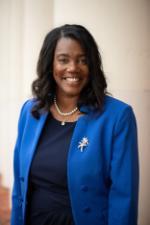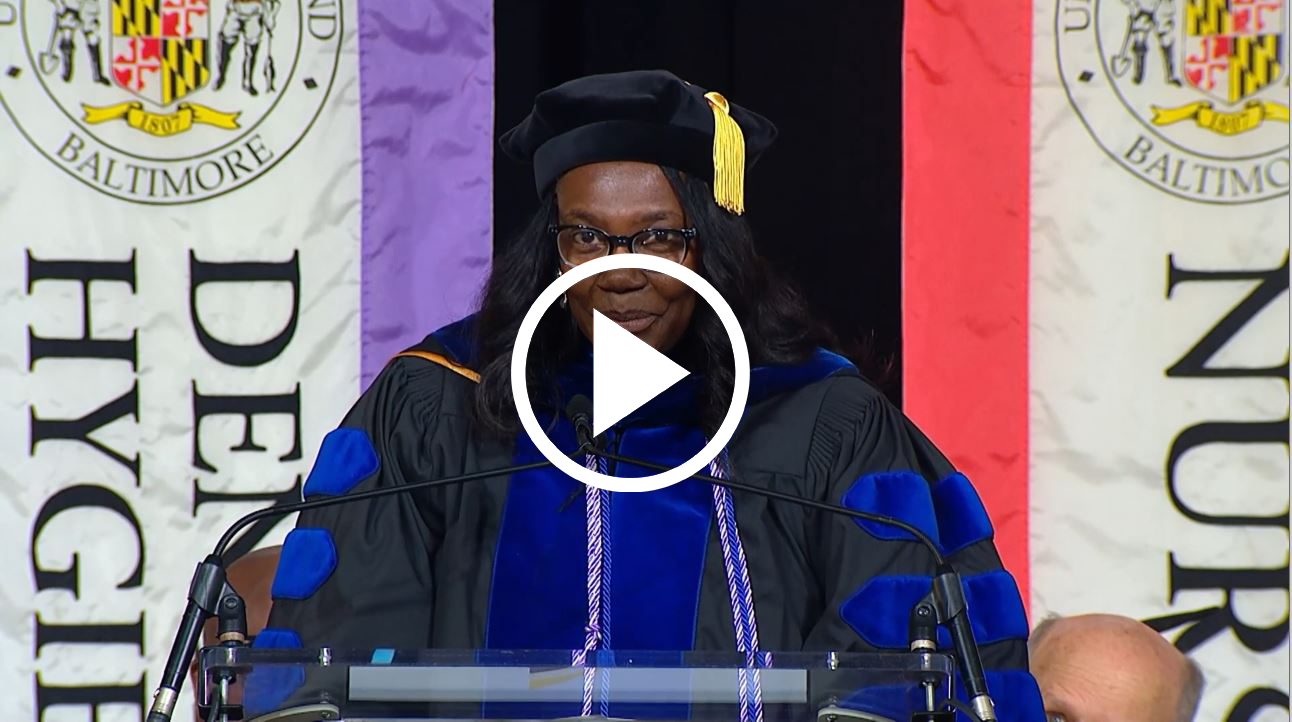Yolanda Ogbolu, PhD, NNP, FNAP, FAAN, explained the importance of social connections during her lecture at the 2022 inaugural UMB Faculty Convocation. Read Dr. Ogbolu's remarks
Social Inclusion: The Antidote to Social Isolation
 Researcher:
Researcher:
Yolanda Ogbolu, PhD, NNP, FNAP, FAAN
The Bill and Joanne Conway Dean of the University of Maryland School of Nursing
Professor
Co-Director, Center for Health Equity and Outcomes Research
Areas of Expertise:
Ogbolu's work focuses on addressing health inequities in local and global communities, specifically related to newborns and families residing in marginalized communities.
The BIG Idea:
Ogbolu seeks to identify solutions to ensure that everyone has a fair and just opportunity for optimal health. She does this by addressing social determinants of health that can lead to inequities.
Through her study "Family Social Inclusion: Global Learning from Brazil to Baltimore," Ogbolu is working to dismantle inequities in five key areas: health, education, income, housing, and global citizenship, which means making sure people have the necessary documentation to be included in society, from birth certificates to social security cards.
The study's Belong to Baltimore program, which was developed as an adaptation of Institute Dara program (formerly the Saúde Criança Association) in Brazil, provides a framework for mothers to work alongside a family coach who meets with them monthly to develop and implement a family action plan that addresses social determinants of health. Mothers also attend monthly support group meetings, which allow families to connect with each other. The program is focused on the vision that social inclusion is a central aspect of health.
Throughout the one-year program, Ogbolu's team measures social isolation, social determinants of health, anxiety, stress, and hope at initiation, six months, and 12 months. At the conclusion of the study, the team will analyze social isolation and mental health outcomes to determine if the interventions have made a difference.
Why does the research matter?
"Growing up in West Baltimore, I was socially isolated as a child. I spent most of my time hiding in the local library, reading books," Ogbolu says. "Now, in my work as a researcher, I understand the dangers of social isolation."
There is much research that identifies the effects of social isolation in older adults, but what many are not aware of are the cumulative effects. Children who are socially isolated have poorer physical and mental health 20 years later, compared to adults who were not socially isolated as children.
"Some studies have even shown that being socially isolated is as dangerous as smoking 15 cigarettes a day, as having high blood pressure, or as having high cholesterol," Ogbolu explains. "Armed with this knowledge, I've been on a journey to really understand and identify solutions for social isolation."
Who does the research matter to?
Ogbolu's study focuses on families with young children, up to age 5, who reside in marginalized communities in Baltimore.
"Given the cumulative nature of social isolation, this is a critically important population," Ogbolu says. "Addressing social isolation early in life with marginalized families could benefit public health and well-being for generations. If children can establish tight social connections early on, there is less risk of the adverse consequences associated with social isolation."
Having traveled extensively while working in global health for two decades, Ogbolu has found that Baltimore is not alone in the challenges it faces. Health inequities that limit opportunities transcend national borders, Ogbolu explains. "One really great thing about this ongoing research is that I'm learning from other countries how to address health inequities in Baltimore. This program, which started in Brazil, is being culturally adapted and tailored for families in Baltimore," she says.
What are the clinical applications of the research?
"Social inclusion, which I believe is the antidote to social isolation, improves the terms on which families take part in society — improving the ability, opportunity, and dignity of disadvantaged families and communities," Ogbolu says.
Ogbolu has seen that the mothers participating in her study are powerful and have the capacity to overcome their challenges related to social determinants of health, but they seek information, attention to their specific needs, and connections to social resources that seem invisible to them, as the mothers are unaware of them and do not know how to find them.
"What we've seen so far is that when mothers first come in, they really have some difficulty defining their goals," Ogbolu explains. "But ultimately, they are able to think about and establish the goals that they want to achieve. These goals are not just for themselves, but for their entire family. It has been exciting to have families set goals for improving their health after not seeing a doctor for several years and then see them and their families catch up on dental and doctor's appointments."
Through the study, the mothers are also able to connect with other people facing similar challenges within their support groups, so they don't feel as isolated. The support groups also include critical conversations focusing on key topics such as developing strengths, self-care, racial injustice, civic engagement, and entrepreneurship. Ogbolu says they've seen the study's six cohorts of families making progress toward achieving some of their goals.
"One of the things that I've always been a bit curious about is to what extent does hope mitigate feelings of social isolation," Ogbolu says. "As a child, even though I was socially isolated, I had a sense of hope that things would be better in the future. What I found for these participating mothers and families is that 55% of them have high hopes. I find it really interesting that despite living in an environment that is not optimal, these families still remain very hopeful. One of the things in the early findings is that as their hope increases, their social isolation decreases. I'm really excited about that finding."
If investments are made to dismantle social isolation for children early in life, the return could be substantial, Ogbolu says. Social inclusion programs like the Belong to Baltimore program could continue to be piloted, scaled up, and implemented in cities in the United States and abroad that are facing similar challenges.
Ogbolu's ongoing research has also led to the creation of the Global Learning for Health Equity Network, funded by the Robert Wood Johnson Foundation, which will bring together national researchers who are implementing global ideas from other countries to address health care inequities here in the United States, a process called "global learning."
